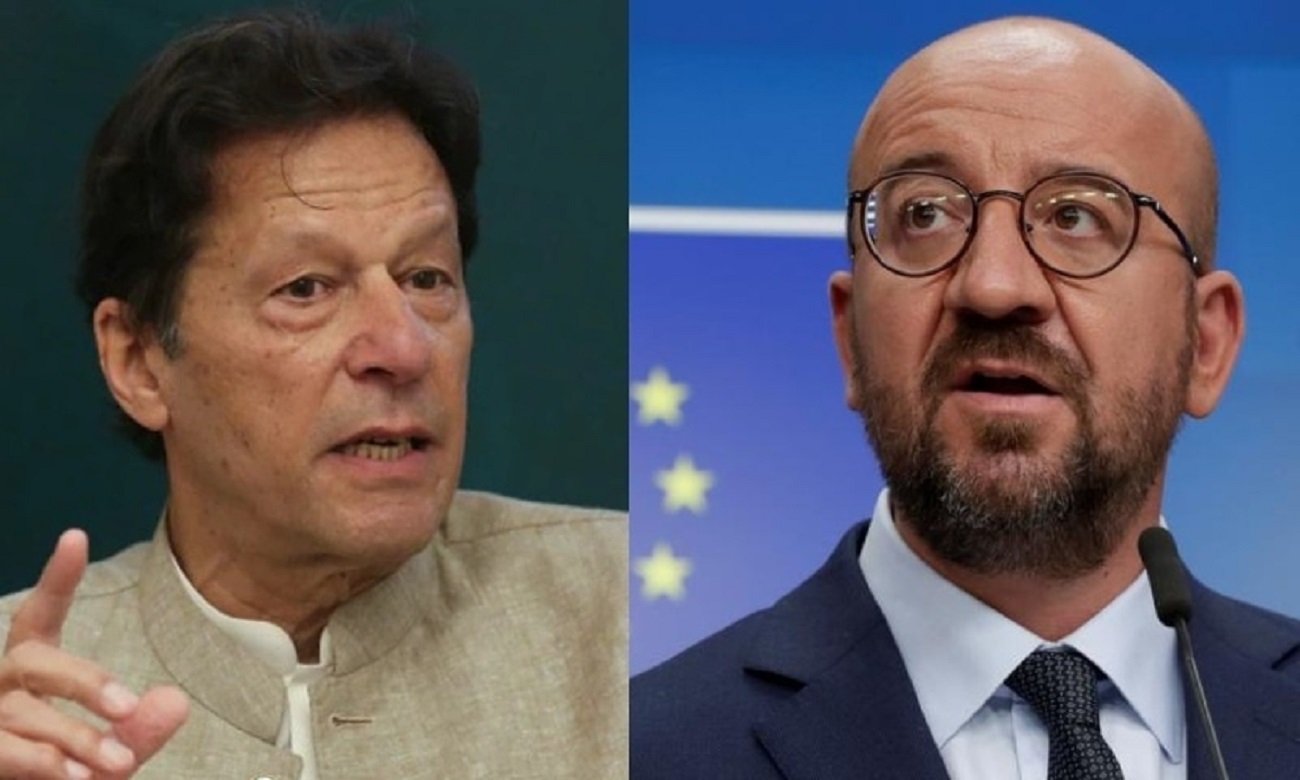Prime Minister Imran Khan received a telephone call from European Council President Charles Michel on Monday and reiterated the call for finding a solution to the Russia-Ukraine conflict through “dialogue and diplomacy”.
The premier posted the update on Twitter, saying he shared concerns over the continued military conflict, highlighted its adverse economic impact on developing countries and stressed the urgent need for a ceasefire and de-escalation.
“I emphasised the importance of humanitarian relief and reiterated [the] call for a solution through dialogue and diplomacy. We agreed that countries like Pakistan could play a facilitating role in this endeavour. I look forward to close engagement to promote shared objectives,” he said.
Later, in a detailed statement, the Prime Minister’s Office (PMO) said PM Imran expressed “deep concern” over the military conflict and stressed that further escalation would have a negative impact on the region and the world.
“The prime minister added that he had been persistently highlighting the adverse economic impact of conflict on developing countries,” the statement said.
Emphasising that Pakistan had maintained a principled position that it would only be a partner for peace, the premier stressed the urgent need for a ceasefire as well as the importance of humanitarian relief for civilians in Ukraine.
“The prime minister underlined that Pakistan had friendly ties with Russia and Ukraine and had remained in close contact with both sides. The prime minister expressed the hope that the dispute would be resolved through dialogue and diplomacy.
“The two leaders agreed that countries like Pakistan could play a facilitating role in these endeavours and that both sides would remain closely engaged to promote shared objectives,” the statement said.
Meanwhile, the premier underscored the importance of Pakistan’s relations with the EU and conveyed that he was looking forward to his visit to Brussels to meet the bloc’s leadership. “He also extended an invitation to Michel to visit Pakistan,” the statement said.
PM lashes out at EU envoys
The prime minister’s interaction with Michel comes a day after he lashed out at a statement by European Union ambassadors calling on Pakistan to condemn Russia for its invasion of Ukraine.
In a joint letter written to Pakistan last week, the ambassadors of 23 countries had asked Islamabad to support a United Nations General Assembly resolution condemning Russia’s aggression and demanding its immediate withdrawal.
“Have you ever acknowledged Pakistan’s support in the ‘war against terror’ which claimed 80,000 lives and caused other collateral damage,” he asked while addressing a public meeting in Mailsi town of Vehari district on Sunday.
“Has anyone of you severed trade relations with India or objected to its unlawful actions?” he questioned, adding, “are we slaves and act according to your wishes?”.
The prime minister said Pakistan did not want any confrontation with any country and wanted to have good relations with all — Russia, the US, China and Europe.
“Islamabad is not in any camp. We are neutral and make efforts that the Russia-Ukraine war should come to an end at the earliest as it is a great loss to the world,” he said.
The premier also chided the EU ambassadors for not even appreciating Pakistan’s role in the Nato war.
Last week, the UNGA passed a non-binding resolution, demanding the immediate withdrawal of all Russian troops from Ukraine. Out of five South Asian nations, only Nepal voted for the resolution while Pakistan, India, Bangladesh and Sri Lanka decided to abstain.
Pakistan’s Ambassador Munir Akram had also asserted in the UN that Islamabad supported all efforts to restore peace in Ukraine. “We are advocating a ceasefire and negotiations. If we had joined the Ukraine resolution, we would have no political space for diplomacy between the two sides,” he had asserted.


 Latest News2 days ago
Latest News2 days ago
 Business2 days ago
Business2 days ago
 Latest News2 days ago
Latest News2 days ago
 Latest News2 days ago
Latest News2 days ago
 Business2 days ago
Business2 days ago
 Latest News2 days ago
Latest News2 days ago
 Latest News22 hours ago
Latest News22 hours ago
 Entertainment2 days ago
Entertainment2 days ago



















